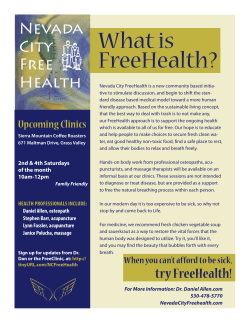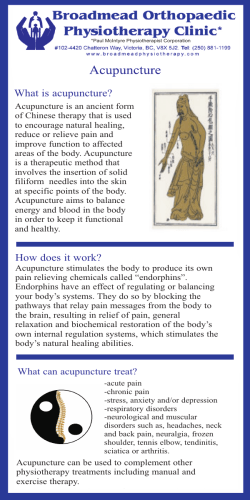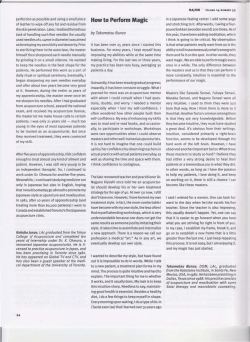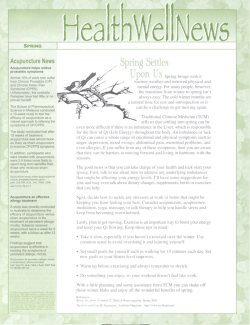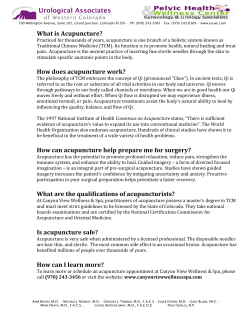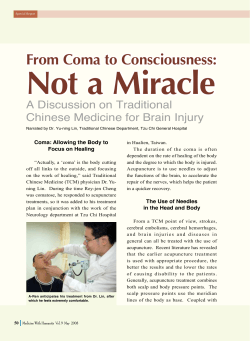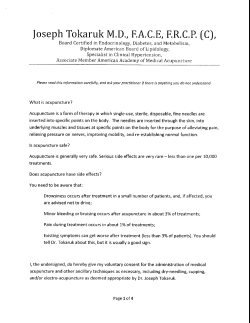
WWWQ News æé»é®å - American TCM Society ç¾å½ä¸å»è¯éç¸å¦ä¼
WWWQ News 望闻问切 www.ATCMS.org Editors of This Issue: Ling Zheng, Edward Mao Legal Advisor Li Yang, Attorney at Law Office: 718-445-7208 Newsletter of American TCM Society 美国中医药针灸学会 通讯 May 30, 2015 Vol: 30 Summer Issue About WWWQ Wang 望:inspection Wen 闻:listening & smelling Wen 问:inquiry Qie 切:palpation Announcement of ATCMS Summer Seminar on July 12, 2015 Dear ATCMS Members and AOM Colleagues: It is our pleasure to announce that ATCMS will host the Summer Seminar at Sheraton LaGuardia East Hotel in Flushing, NYC, on Sunday, July 12, 2015. On behalf of ATCMS, we cordially invite everyone to attend this event. During the upcoming seminar, Prof. Wei-Dong Shen, the invited speaker from Shanghai University of TCM, will give us a talk on the topic of “The Clinical Acupuncture Experience of Dr. Wei-Dong Shen”. He will share his knowledge and clinical experience in treating endocrine disorders, encephalopathy, tinnitus and deafness, and neck and back pain. Also, he will demonstrate his acupuncture needling techniques during this seminar. Prof. Shen is the Director of the Acupuncture Department of Shuguang Hospital in Shanghai, where he leads the Acupuncture Research Department and the Acupuncture Anesthesia Department. He is also the Director of the China Association of Acupuncture-Moxibustion, Executive Director of the Shanghai Acupuncture-Moxibustion Association, Vice-Chairman of the Acupuncture Anesthesia Professional Committee and Vice-Chairman of the Acupuncture and Rehabilitation Professional Committee of the Shanghai Acupuncture-Moxibustion Association, and Executive Director of the Health Care & Rehabilitation Committee and Executive Director of the Translation Committee of the World Federation of Chinese Medicine Societies. As an acupuncture expert and researcher, he has published 85 papers in the top of acupuncture journals. Prof. Shen has a high reputation for his knowledge and clinical experience in Oriental Medicine and Acupuncture, particularly in the field of neck-shoulder pain, lumbrosacral pain, soft tissue injury, pain syndromes, nerve injuries, encephalopathy, tinnitus & deafness, endocrine disorders, and obesity. The highlights of this seminar include: Eight-Needles Treatment for Neck-Shoulder Pain and Lumbrosacral Pain Acupuncture Treatment for Endocrine Disorders, such as Thyroid Diseases and Diabetes Acupuncture Treatment for Encephalopathy, such as Parkinson’s Disease Acupuncture Treatment for Tinnitus and Deafness This seminar will start at 9:00 am and end at 3:30 pm (Registration: 8:00 am - 9:00 am). Attendees will obtain 6 NCCAOM CEUs. For detailed seminar information, please read “The Notice of ATCMS Summer Seminar” in this newsletter, or contact Dr. Liao at: 917-605-5819. We are looking forward to seeing everyone on July 12, 2015. Academic Sub-committee American TCM Society (ATCMS) 1 of 4 Announcement of ATCMS Workshop Considering our acupuncture colleagues’ requirement, ATCMS will arrange a workshop right after the seminars on July 12, 2015. During the upcoming workshop, we will invite Pro. Wei-Dong Shen, a famous acupuncture expert, to demonstrate his acupuncture needling techniques. The details are described as follows: Date & Time: Sunday, July 12, 2015, 5:00 pm—7:00 pm Location: 140-08 Sanford Ave., C Fl., Flushing, NY 11355 High-Lights: To demonstrate the advanced needling techniques including (1) Eight-Needles Treating Neck-Shoulder Pain, and (2) Eight-Needles Treating Lumbocrural Pain. Language: Presented in both Chinese and English Fee: ATCMS member and student: $60; others: $80 Registration: Pre-registration required. Please make a check (payable to ATCMS) and mail it with your personal contact information (including your name, telephone number, and email address) to: ATCMS, 14 East 34th Street, 5th Floor, New York, NY 10016. Due to limited seats, acceptance is based on first-come, first served policy. Please register ASAP. If you have any questions, please email to:firstacu@hotmail.com, or call Dr. Shi at: 516-906-1120 A Randomized, Double-blind, Placebo-controlled Trial Reveals: Acupuncture Reduces Post-operative Pain In recent year, in spite of significant breakthrough in the field of clinical research for the use of acupuncture in pain management, the debate regarding the use of acupuncture remains. The focus of the debate centers on whether the effect of acupuncture can be completely or mainly attributed to placebo effect. Although researchers have continuously altered and improved their study design and method of delivery, the demand for a gold-standard study satisfying the criteria of double-blinded randomized controlled trial remains unsettled. In reality, such strict study-design is rarely accomplished in any procedural treatments, including various surgical procedures and physical therapies. The main difficulty comes from the criteria of “double-blind”. For a procedure that applies sensory stimuli to the subject, it is impractical to satisfy statistical analysis requirements while maintaining medical ethics and morality. To question the effectiveness of acupuncture based solely on the need to satisfy such criteria may seem logical from an academia point-of-view, but such inquiry is in fact biased and unjust. Despite such difficulties, this improbably obstacle has been conquered by the dedicated researchers of acupuncture yet again. (Please read the following page continually) 2 of 4 (To follow up the page 2) A recent paper, “Intraoperative acupuncture for posttonsillectomy pain: A randomized, double-blind, placebo-controlled trial” was published on April 2015 in The Laryngoscope, a publication of The American Laryngological, Rhinological and Otological Society. This double-blind, randomized, placebo-controlled study was conducted by doctors from two Stanford University School of Medicine departments, the Department of Otolaryngology-Head and Neck Surgery and the Department of Anesthesia. Funding sources are the Stanford University Medical Scholars Research Program, Howard Hughes Medical Institute Medical Fellow Program, and the Stanford Children’s Health Research Institute Akiko Yamazaki and Jerry Yang Faculty Scholar. Methods: “Patients aged 3 to 12 years undergoing tonsillectomy were recruited at a tertiary children's hospital between February 2011 and May 2012. Participants were block-randomized to receive acupuncture or sham acupuncture during anesthesia for tonsillectomy. Surgeons, staff, and parents were blinded from treatment. Tonsillectomy was performed by one of two surgeons using a standard technique (monopolar cautery), and a single anesthetic protocol was followed. Study endpoints included time spent in the postanesthesia care unit, the amount of opioids administered in the perioperative period, and pain measures and presence of nausea/vomiting from postoperative home surveys.” Results: “Fifty-nine children aged 3 to 12 years were randomized to receive acupuncture (n = 30) or sham acupuncture (n = 29). No significant demographic differences were noted between the two cohorts. Perioperative data were recorded for all patients; 73% of patients later returned home surveys. There were no significant differences in the amount of opioid medications administered or total postanesthesia care unit time between the two cohorts. Home surveys of patients but not of parents revealed significant improvements in pain control in the acupuncture treatment-group postoperatively (P = 0.0065 and 0.051, respectively), and oral intake improved significantly earlier in the acupuncture treatment group (P = 0.01). No adverse effects of acupuncture were reported.” Conclusions: “This study demonstrates that intraoperative acupuncture is feasible, well tolerated, and results in improved pain and earlier return of diet postoperatively.” The Stanford University researchers noted that the study of acupuncture during surgery is a “relatively new area of research.” They added that “one of the strengths of this study is its rigorous double-blinded randomized design with a sham acupuncture control.” Based on the positive patient outcomes for both pain reduction and oral intake restoration, the researchers suggest further studies with larger sample sizes. ( Ming Liu ) Reference: Tsao, Gabriel J., Anna H. Messner, Jeannie Seybold, Zahra N. Sayyid, Alan G. Cheng, and Brenda Golianu. "Intraoperative acupuncture for posttonsillectomy pain: A randomized, double-blind, placebo-controlled trial." The Laryngoscope (2015),first published online: 7 APR 2015,DOI: 10.1002/lary.25252 3 of 4 . ATCMS Seminar on July 12, 2015 www.ATCMS.org Time: Sunday, July 12, 2015, 9:00 am – 3:30 pm (Registration: 8:00 am – 9:00 am) Place: Sheraton LaGuardia East Hotel, 7th Floor, Gallery Room 135-20 39th Ave., Flushing, NY 11354 Title: The Clinical Acupuncture Experience of Dr. Wei-Dong Shen Speaker: Prof. Wei-Dong Shen, famous acupuncture expert from Shanghai Language: Presentation in Chinese with English real-time translation, 20 headsets, first-come, first-served basis. For reservation: atcmsny@gmail.com Credits: 6 NCCAOM CEU Fees: $60 for ATCMS members and students, $90 for others Contact: (917) 605-5819 (Dr. Liao) American TCM Society 14 East 34th Street, 5th Floor New York, NY 10016, U.S.A. Tel (212) 689-1773 www.ATCMS.org
© Copyright 2025
